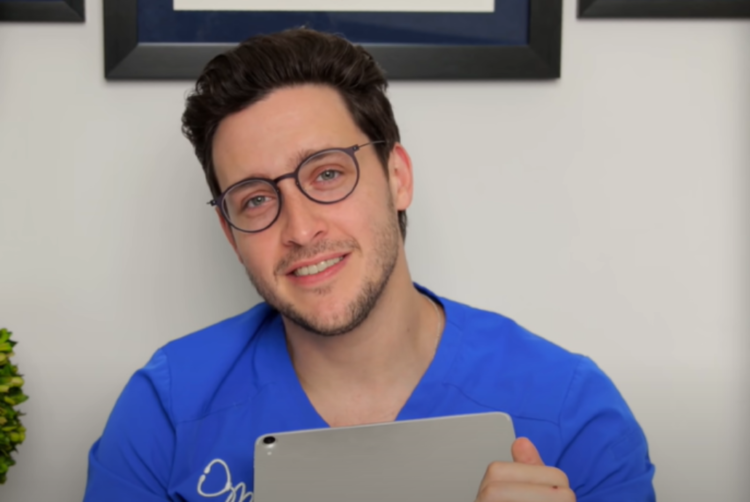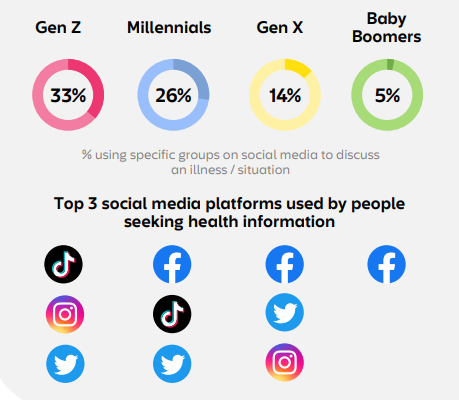Dr TikTok? Why younger audiences are turning to influencers for healthcare information

Over 6 million people in the UK and nearly 59 million people in the US now use social media influencers on TikTok, Instagram, and Facebook for general healthcare information or for help in dealing with chronic health conditions.
That is according to the latest report from Hall & Partners, Omnicom’s Communications Consultancy Network, which also found that use of social media for health information is primarily done by younger generations.
Globally, 33% of Gen Z and 26% of millennials (compared to 5% of Baby Boomers) will use social media to discuss illness. For Gen Z, the top platform is TikTok followed by Instagram and Twitter. Millennials, Gen X, and Boomers turn to Facebook first instead.
For individuals with chronic health conditions, relying on social media for information has become a standard regardless of age. For example, 29% of individuals with inflammatory bowel disease (IBD) use specific groups on social media for health information, while 28% rely on online influencers.
The use of healthcare influencers comes following a pandemic in which individuals were asked to forego regular health procedures. Additionally, at times rapidly changing public health guidance throughout Covid led to sentiments of mistrust of medical institutions among segments of the population.

The pandemic also caused skyrocketing wait times for NHS services in the UK. According to figures from the Royal College of Nursing, the country’s largest nursing union, nearly 43,000 nurses in the early stages of their careers have quit over the past five years. Currently NHS England posts 47,000 vacant nursing positions.
Due in part to a lack of pay rises among health professionals in England, various health unions have announced planned strikes throughout February and March, which will further exacerbate wait times and stretch emergency services. 140,000 medical appointments have been cancelled due to the strikes, with up to 10,000 individuals forced to now wait up to 18 months for needed surgeries.
Lucy Ireland, partner at Hall & Partners, comments that as the strikes continue to delay health access, the trend toward using social media as a supplement or replacement for speaking to a doctor is likely to accelerate.
“Younger generations have grown up with the internet and have moved to using it as a resource to make many different decisions in their life – what to purchase, where to eat, etc. As such, it naturally flows over into their health decision making. […] More digital solutions will be an important element in reconnecting younger patients with traditional sources of healthcare advice.”
In total, the latest figures from the British Medical Association show that around 7.2 million Brits are awaiting NHS treatment, with a record-high 3.1 million patients waiting over 18 weeks and in excess of 400,000 waiting over a year. The median wait time for health treatment has jumped 73% since before the pandemic to 14.4 weeks.
In the US, meanwhile, the lack of access to affordable healthcare causes many to avoid seeking medical attention in general. According to the Hall & Partners report, one in five Americans say they avoid seeing a doctor because of the high cost.
‘We all need to be more discerning about who we place our trust in online’
Using influencers and other online sources for health information comes with risks. News trustworthiness ratings company NewsGuard regularly points out that digital media is riddled with dangerous health misinformation.
“Talk to any doctor and he or she will tell you that they waste lots of time talking patients out of something they’ve read or seen online,” says Steven Brill, co-founder and co-CEO of NewsGuard. He notes that, unlike political propaganda or election disinformation, healthcare disinformation is often backed by an economic incentive, such as a “rip-off oncologist [saying] these fruit pits will cure cancer.”
Brill warns against advertising against such bad actors online, and laments the normalisation of medical ads in the US, which is one of the few countries to allow direct-to-consumer health and prescription drugs advertising.
In the UK, more guardrails are in place to protect consumers from misinformation. Namely, the UK’s Medicines & Healthcare products Regulatory Agency requires that ads for medicines not contain material which “refers to a recommendation by scientists, healthcare professionals or persons who because of their celebrity, could encourage the consumption of medicinal products”.
Not all healthcare influencers are necessarily peddling falsehoods. Though Scott Guthrie, director general of the Influencer Marketing Trade Body, tells The Media Leader that the area is “ripe for misinformation from well-meaning and unqualified people,” there nonetheless exist many health influencers that provide entertaining and reliable evidence-based material to young consumers by meeting them on social platforms.
“We saw an uptick in influencers promoting health issues during the Covid pandemic. The World Health Organisation along with the United Nations and governments around the world sought out influencers to carry important messaging on social distancing, mask wearing, Covid tracking and the importance of getting vaccinated.
“Why were influencers sought out? One-in-three consumers aged 44 or younger are more likely to source news updates and opinions from influencers than from journalists and established news outlets.”
Guthrie names popular American YouTube personality Dr Mike and NHS doctor and Instagram influencer Ranj Singh as medical professionals that communicate reliable and entertaining health information to large audiences. On the flipside, he recognises that influencers without medical training have spread misleading or false and harmful information about health to sizeable followings.
Beyond regulatory measures, Guthrie says that social media companies should follow YouTube’s policy of only allowing medical influencers to be verified if they meet certain criteria, such as providing proof of their medical license. And he adds that consumers have a responsibility to improve their personal media literacy, especially when it comes to the subject of our personal health.
“We all need to be more discerning about who we place our trust in online. We need to undertake our own internal audit before following their advice. Are they credible? Are they trustworthy? Do they have authority through medical professional qualifications?”
The Hall & Partners study, titled Patient Trendscoping: What You Need To Know About Patients of the Future, is based on detailed online surveys taken by 10,500 over-18s in the US, China, UK, Germany and Japan and was conducted between July and September 2022 in partnership with boutique healthcare consultancy ThinkNext.




